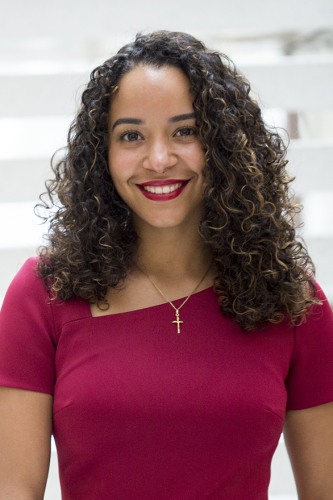
Gisel Bello MD'22
Biography
Gisel grew up in the housing projects of Harlem, the daughter of Dominican immigrants, and is a proud first-generation graduate. She earned her bachelor’s in biological sciences from the University of Rhode Island, where she founded Seeds of Success, a student-run organization committed to helping underrepresented students in the College of the Environment and Life Sciences attain a holistic educational experience during their time at URI.
At the Medical School Gisel held leadership positions in the Student National Medical Association and the Latino Medical Student Association, and served as a board member of the Women’s Clinic at Clinica Esperanza in Providence. Passionate about women's reproductive health, health disparities, and global health, she has traveled to the Dominican Republic, Guatemala, and Honduras to help provide medical services to rural communities. She also spent a month in the mountains of Peru to train in indigenous birthing practices. “It was one of those life-altering experiences,” she says.
The ODMA fellowship ticked a lot of boxes for her. “I have always been really interested in education, mostly around underrepresented students, because had I not received mentorship and guidance and love throughout my schooling, there’s definitely no way that I would be here today,” says Gisel, now an obstetrics and gynecology resident at Emory University.
Gisel created a podcast, You Are Med, during her fellowship year to share the stories of underrepresented students with future applicants. “As underrepresented people, there’s always an aspect of loneliness. It feels like it’s only ever you going through this struggle,” she says. “But whenever I shared [a particular challenge] with other underrepresented people, they’d say that happened to them too, and this is how they dealt with it. Those were the stories that got me through the harder moments of medical school.”
As a fellow, Gisel served as a liaison between students and the administration. “I thought that I had some good ideas for bridging those gaps,” she says. “As medical students we have such great insight on what it is to be a medical student that sometimes the faculty just forget because they’re however many years out.” She gained some understanding of how the Medical School was run, and had “deep conversations with faculty that have the ability to change the way things are done.”
The ODMA fellowship cemented Gisel’s interest in academic medicine, and thanks to her experience attending faculty meetings, and learning how they think and talk, she had “the confidence to say in residency interviews I would love to be a generalist because I want to have one foot in clinical and one foot in medical education,” she says. Every interviewer, she adds, wanted to hear all about her time with ODMA.
“The fellowship allows a lot of freedom, a lot of mentoring that gives you an upper hand when applying for residency,” she says. “I would definitely do it all over again.”